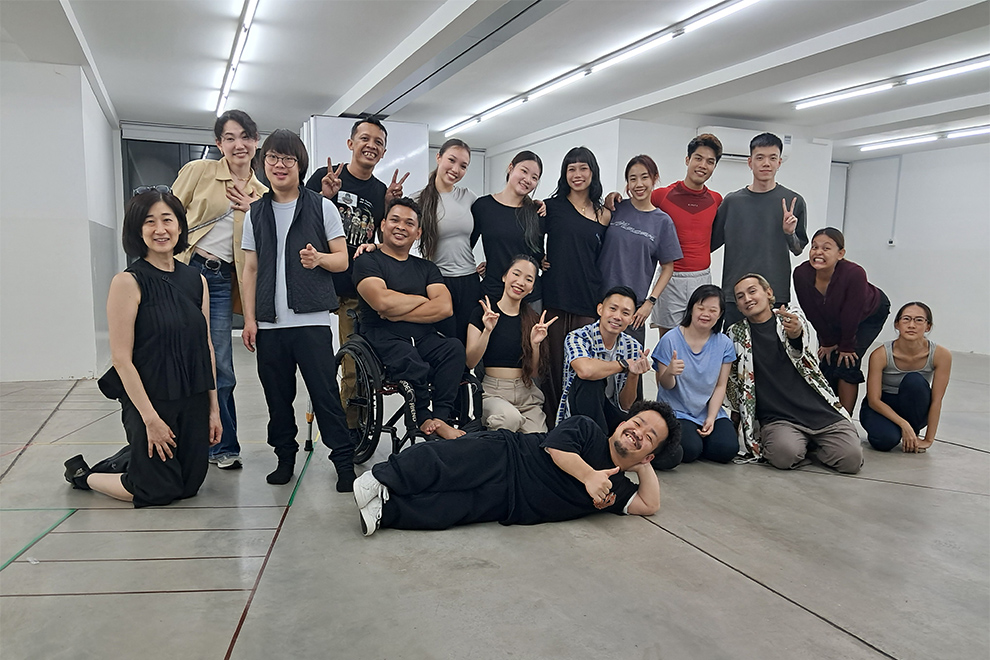
Cambodian contemporary dancer Kim Socheat (left) rehearses with contemporaries from other countries before the event, held in Singapore. Supplied
The Singapore International Festival of Arts (SIFA) 2025, running from May 16 to June 1, celebrates Singapore's 60th anniversary with over 150 performances and events, including 15 new local commissions.
One of the standout performances is COLONY – A True Colors Project, a powerful fusion of dance, music, and film.
The work features 13 diverse dancers from across Southeast Asia, from Singapore, Japan, Indonesia, Cambodia and Thailand — each with their own artistry and lived experiences.

13 diverse dancers from across Southeast Asia, from Singapore, Japan, Indonesia, Cambodia and Thailand will perform COLONY – A True Colors Project at The Singapore International Festival of Arts (SIFA) 2025. Supplied
The performance goes beyond showcasing differences and instead emphasises equality and collaboration, creating a shared stage where all dancers, regardless of ability or background, come together as equal partners.
Among the featured artists is Cambodian contemporary dancer Kim Socheat, who is making waves on the international stage.
Born in Phnom Penh and having lost both of his legs to polio at the age of one, Socheat's journey into dance is both inspiring and groundbreaking.
A former pianist, Socheat discovered contemporary dance through his older brother, a disabled dancer in Kampot Province.
“It really got me interested, and I immediately took up performing,” Socheat recalls.
At 32, Socheat has performed in major events, including representing Cambodia at the SEA Games and Para Games.
He also showcased his talents in Cambodia’s Got Talent, where his skills as a contemporary dancer gained significant attention.
However, his participation in COLONY – A True Colors Project at SIFA 2025 marks a pivotal moment in his career.
Having first performed with the project in 2017 as a supporting artist, Socheat has returned to the stage in 2025, now as a soloist.
“For the 2025 event, I have been invited again, but this time, I am able to showcase even more of my skills and abilities,” Socheat shares.
His excitement is palpable as he describes the collaboration between artists with and without disabilities, highlighting the mutual respect and growth that occurs on stage.
Socheat views this inclusive approach as an opportunity to break down barriers and challenge preconceived notions about disability.
“I am proud of myself because I can perform, I can show my skills to the world,” he tells The Post.
“Especially as a message for disabled people in Cambodia to see how powerful I am. When they feel down, they can look at what I am going through,” he adds.
Socheat also recognises the need for a cultural shift in the Kingdom, where, although disabled artists are understood, they are often not given enough recognition or opportunity.
Despite these challenges, Socheat does not rely on sympathy but instead seeks to prove his capabilities through his art.
He will perform on from May 30 to June 1, with each move underscoring his belief in the power of art to foster inclusion and challenge discrimination.
Socheat’s involvement in COLONY is not just a personal achievement; it’s a milestone for Cambodian disability rights, offering a platform for the world to see the strength and talent of disabled artists.
Through this groundbreaking performance, Socheat and his fellow dancers exemplify the power of inclusivity in the arts, showing that, regardless of background or ability, all artists can create something beautiful and impactful when given the space to do so.










